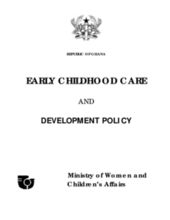EXECUTIVE SUMMARY
Children constitute the future leadership and workforce of each nation and therefore require serious commitment from the adult population, particularly state institutions to ensure their proper growth and development into adulthood. This is given credence and is manifested in the various Constitutional provisions and Parliamentary Acts and Legislative Instruments by the Government and people of Ghana.
Their future lies in the provision of measures and actions that will provide appropriate levels of protection, survival and development policy aimed at achieving the above by providing the necessary framework and direction for guiding various policy actions as defined.
This policy document replaces various uncoordinated, sector-biased programmes developed and implemented by the Ministry of Education Youth and Sports, Ministry for Employment and Manpower Development, the Ministry of Health and, the Ghana National Commission on children and other Stakeholders.
A critical review of these programmes revealed that these programming and implementing organisations rather concentrated more on the cognitive development of the children instead of approaching the Early Childhood Care and Development of our children from a comprehensive position.
The NPP government recognized this weakness in the ECCD focus when it came to power in the 2001.
With the creation of the Ministry for Women and Children Affairs and subsequent development of its structures, the onus for formulating a comprehensive ECCD policy and appropriate programmes for children from birth to age eight, their parents and caregivers became a big challenge and an imperative.
Under the leadership of the Ministry for Women and Children Affairs (MOWAC), various Stakeholders have been brought together to formulate series of drafts culminating in this final document.
This policy document is set out with presentations on the Rationale for the policy Goal, Objectives and Targets, Institutional Arrangements, Implementation Strategies, Cost and Financial Implications and the conclusions drawn from the above presentations.

